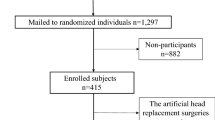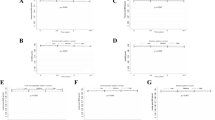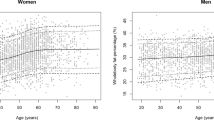Abstract
Objectives: To compare the bone mineral density and dietary intake of elderly Chinese vegetarian women with omnivores, to compare the bone mineral density of Chinese `vegans' and `lactovegetarians', and to study the relationship between nutrient intake and BMD in vegetarians.
Design: A cross-sectional survey.
Setting and subjects: A community-based study. The vegetarian women (aged 70–89 y) (n=76) were non-institutionalized subjects. All of them were Buddhists. Their bone mineral density were compared to normal elderly volunteers (aged 70–89 y) (n=109) who were recruited to establish normal BMD ranges. Their dietary intake was compared to omnivorous subjects from a previous dietary survey (n=250).
Methods: Dietary assessment was by the 24 h recall method, and bone mineral density was measured by dual-X-ray-densitometry. The analysis of co-variance was used to compare the BMD between vegetarians and omnivores, with adjustment for potential confounders. The BMD in `vegans' and `lactovegetarians' were compared by similar methods. The t-test was used to compare dietary intake between omnivores and vegetarians. The relationship between nutrient intake and BMD was studied by correlation and multiple regression.
Results: The dietary calorie, protein and fat intake were much lower, but the sodium/creatinine ratio was much higher in vegetarians than omnivores. The BMD at the spine was similar between vegetarians and omnivores. However, the BMD at the hip was significantly lower in vegetarians at some sites (P<0.05). There was no significant difference in BMD between `vegans' and `lactovegetarians'. BMD in vegetarians appeared to be positively correlated with energy, protein and calcium intake; and negatively associated with urinary sodium/creatinine levels.
Conclusions: There is a relationship between diet and BMD. The BMD at the hip was lower in vegetarians than omnivores, but no difference was observed between `vegans' and `lactovegetarians'. There is a complex relationship between the intake of various nutrient and BMD in vegetarians.
Sponsorship: None
This is a preview of subscription content, access via your institution
Access options
Subscribe to this journal
Receive 12 print issues and online access
$259.00 per year
only $21.58 per issue
Buy this article
- Purchase on Springer Link
- Instant access to full article PDF
Prices may be subject to local taxes which are calculated during checkout
Similar content being viewed by others
Author information
Authors and Affiliations
Rights and permissions
About this article
Cite this article
Lau, E., Kwok, T., Woo, J. et al. Bone mineral density in Chinese elderly female vegetarians, vegans, lacto-vegetarians and omnivores. Eur J Clin Nutr 52, 60–64 (1998). https://doi.org/10.1038/sj.ejcn.1600516
Received:
Revised:
Accepted:
Published:
Issue Date:
DOI: https://doi.org/10.1038/sj.ejcn.1600516
Keywords
This article is cited by
-
Comparison of human bone mineral densities in subjects on plant-based and omnivorous diets: a systematic review and meta-analysis
Archives of Osteoporosis (2021)
-
The significant effect on musculoskeletal metabolism and bone density of the Eastern Mediterranean Christian Orthodox Church fasting
European Journal of Clinical Nutrition (2020)
-
Nutritional and health attributes of milk and milk imitations
European Journal of Nutrition (2020)
-
Dietary protein and bone health across the life-course: an updated systematic review and meta-analysis over 40 years
Osteoporosis International (2019)



